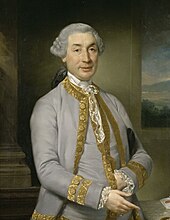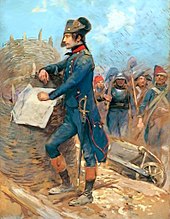Origins and education
Napoleon was born on 15 August 1769 to Carlo Maria di Buonaparte and Maria Letizia Ramolino in his family's ancestral home, Casa Buonaparte, in the town of Ajaccio, the capital of the island of Corsica. He was their 4th child and 3rd son. This was a year after the island was transferred to France by the Republic of Genoa.[6] He was christened Napoleone di Buonaparte, probably named after an uncle (an older brother, who did not survive infancy, was the first of the sons to be called Napoleone). In his twenties, he adopted the more French-sounding Napoléon Bonaparte.[7][note 1]
The Corsican Buonapartes were descended from minor Italian nobility of Tuscan origin, who had come to Corsica from Liguria in the 16th century.[8][9]
His father, Nobile Carlo Buonaparte, an attorney, was named Corsica's representative to the court of Louis XVI in 1777. The dominant influence of Napoleon's childhood was his mother, Letizia Ramolino, whose firm discipline restrained a rambunctious child.[10] Napoleon's maternal grandmother had married into the Swiss Fesch family in her second marriage, and Napoleon's uncle, the later cardinal Joseph Fesch, would fulfill the role as protector of the Bonaparte family for some years.
He had an elder brother, Joseph; and younger siblings, Lucien, Elisa, Louis, Pauline, Caroline and Jérôme. A boy and girl were born before Joseph but died in infancy. Napoleon was baptised as a Catholic.[11]
Napoleon's noble, moderately affluent background and family connections afforded him greater opportunities to study than were available to a typical Corsican of the time.[12] In January 1779, Napoleon was enrolled at a religious school in Autun, in mainland France, to learn French. In May he was admitted to a military academy at Brienne-le-Château.[13] He always spoke with a marked Corsican accent and never learned to spell French properly.[14] Napoleon was teased by other students for his accent and applied himself to reading.[15] An examiner observed that Napoleon "has always been distinguished for his application in mathematics. He is fairly well acquainted with history and geography... This boy would make an excellent sailor."[16][note 2]
On completion of his studies at Brienne in 1784, Napoleon was admitted to the elite École Militaire in Paris. He trained to become an artillery officer and, when his father's death reduced his income, was forced to complete the two-year course in one year.[18] He was the first Corsican to graduate from the École Militaire.[18] He was examined by the famed scientist Pierre-Simon Laplace, whom Napoleon later appointed to the Senate.[19]
Early career
Upon graduating in September 1785, Bonaparte was commissioned a second lieutenant in La Fère artillery regiment.[13][note 3] He served on garrison duty in Valence and Auxonne until after the outbreak of the Revolution in 1789, and took nearly two years' leave in Corsica and Paris during this period. A fervent Corsican nationalist, Bonaparte wrote to the Corsican leader Pasquale Paoli in May 1789:
He spent the early years of the Revolution in Corsica, fighting in a complex three-way struggle among royalists, revolutionaries, and Corsican nationalists. He supported the revolutionary Jacobin faction, gained the rank of lieutenant colonel in the Corsican militia, and gained command over a battalion of volunteers. Despite exceeding his leave of absence and leading a riot against a French army in Corsica, he was promoted to captain in the regular army in July 1792.[22]
He returned to Corsica and came into conflict with Paoli, who had decided to split with France and sabotage the French assault on the Sardinian island of La Maddalena in February 1793, where Bonaparte was one of the expedition leaders.[23] Bonaparte and his family fled to the French mainland in June 1793 because of the split with Paoli.[24]
Siege of Toulon
Main article: Siege of Toulon
In July 1793, Bonaparte published a pro-republican pamphlet, Le souper de Beaucaire (Supper at Beaucaire), which gained him the admiration and support of Augustin Robespierre, younger brother of the Revolutionary leader Maximilien Robespierre. With the help of his fellow Corsican Antoine Christophe Saliceti, Bonaparte was appointed artillery commander of the republican forces at the siege of Toulon. The city had risen against the republican government and was occupied by British troops.[25]
He adopted a plan to capture a hill where republican guns could dominate the city's harbour and force the British ships to evacuate. The assault on the position, during which Bonaparte was wounded in the thigh, led to the capture of the city. He was promoted to brigadier general at the age of 24. Catching the attention of the Committee of Public Safety, he was put in charge of the artillery of France's Army of Italy.[26]
Whilst waiting for confirmation of this post, Napoleon spent time as inspector of coastal fortifications on the Mediterranean coast near Marseille. He devised plans for attacking theKingdom of Sardinia as part of France's campaign against the First Coalition.[27] The commander of the Army of Italy, Pierre Jadart Dumerbion, had seen many generals executed for failing or for having the wrong political views. Therefore, he deferred to the powerful représentants en mission, Augustin Robespierre and Saliceti, who in turn were ready to listen to the freshly promoted artillery general.[28]
Carrying out Bonaparte's plan in the Battle of Saorgio in April 1794, the French army advanced north-east along the Italian Riviera then turned north to seize Ormea in the mountains. From Ormea, they thrust west to outflank the Austro-Sardinian positions around Saorge. Later, Augustin Robespierre sent Bonaparte on a mission to the Republic of Genoa to determine that country's intentions towards France.[27]




No comments:
Post a Comment